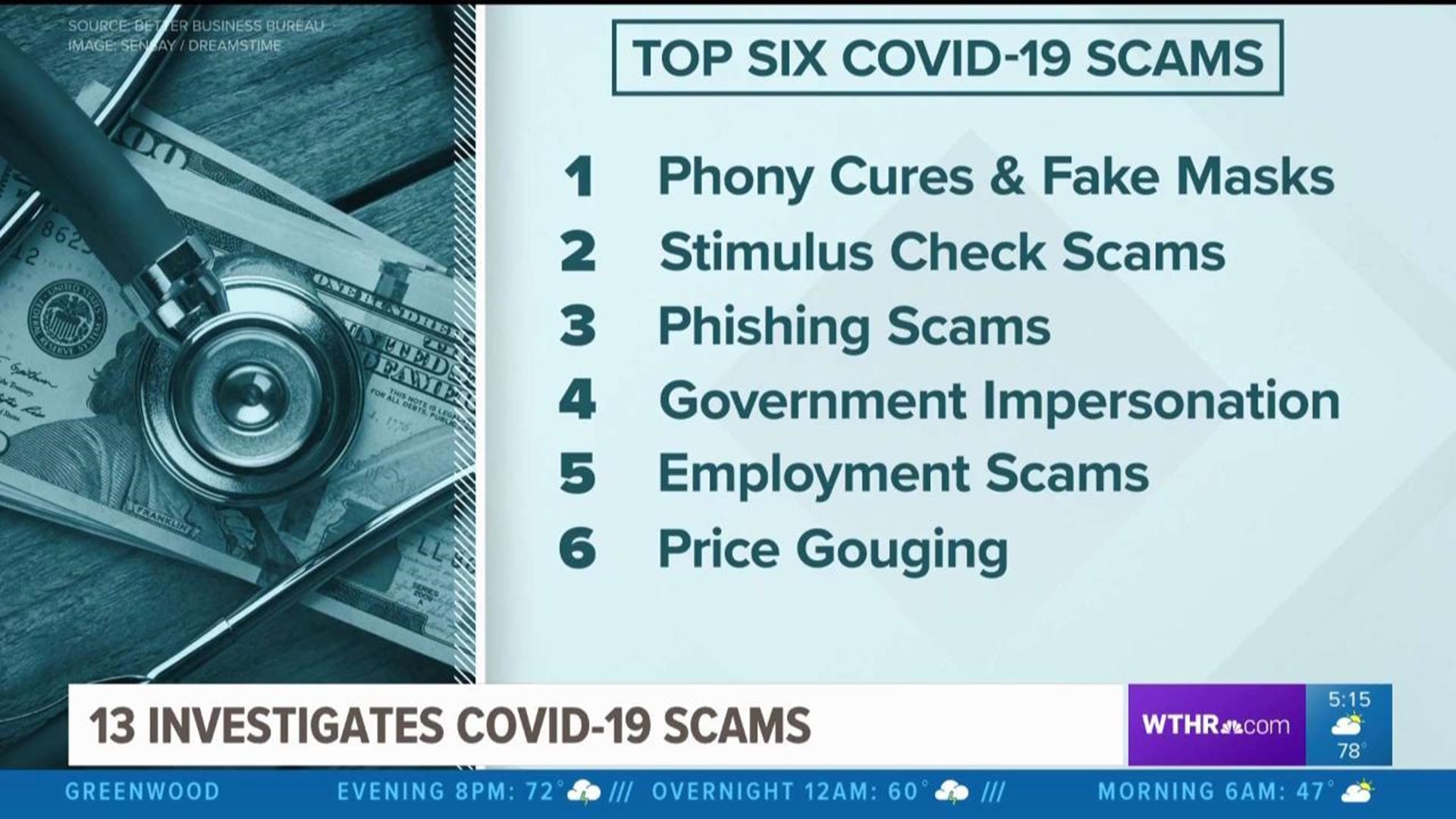INDIANAPOLIS (WTHR) — Criminals are taking advantage of COVID-19 to get your cash or personal information.
13 Investigates reached out to the Central Indiana Better Business Bureau to learn what scams are most common right now and how to stay protected.
Experts told us this is the perfect storm for scammers right now. A lot of us are spending more time at home alone. We're spending more time online on our computers and there's the fear factor: we're worried about getting the coronavirus and worried about when the economy will bounce back. All of that makes us vulnerable to becoming victims.
Here are the top six scams, reported to the Better Business Bureau, where crooks are using the coronavirus to con us:
- Phony Cures and Fake Masks
- Stimulus Check Scams
- Phishing Scams
- Government Impersonation/Online Testing Scams
- Employment Scams
- Price Gouging
The top scam, phony cures and fake masks, has crooks claiming you can buy a secret vaccine that the government has, which can only be accessed by clicking a certain link.
Not true.
"They're saying we've got access to it, so all they want you to do is click on a link or pay some money, those types of things. There is no approved vaccine out there but that's what they're saying," explained Central Indiana BBB President/CEO Tim Maniscalo.
Stimulus check scams are making the rounds, as well.
In fact, a viewer sent us a fake check, from something called "the stimulus relief program."
Real checks will come from the IRS.
This check is not legit. It's from a scammer out of Florida.
Scammers are making calls and sending emails about stimulus checks, too.
Don't take the bait.
"They'll ask for things like your bank account so they can deposit the check," Maniscalo said. "All they're searching for there is information to try to get your personal financial information. Do nothing. The IRS has all the information that they need, particularly if you've filed your income tax return. They're going to take whatever your latest income tax return is and determine your stimulus check from that."
Phishing scams often pretend to be from your company's IT department, claiming the company's been infected by a computer virus.
These are ramping up right now since many of us are working from home.
Don't automatically click the link; Always call your employer to verify first; Fake links can lead to malware.
"Again they're trying to get you to either click on a link or actually take over your computer and hold your computer hostage, and you won't be able to get your computer back until you pay them some money," Maniscalo said.
Some scammers are impersonating the government, claiming you can take a COVID-19 test online.
There's no such thing.
"The government right now is not going out and offering these tests. They certainly aren't doing it online," Maniscalo said. "All the scammers are trying to do is say 'hey the government has the coronavirus test, click on this link, and we'll show you how to get the test' and that link is going to take your computer some place where you don't want it to go."
Employment scams are big right now because so many people are out of work or on furlough.
They usually claim you'll get a check if you pay for training to work from home.
"And that check that they sent you? That's a phony check," Maniscalo said. "About ten days later, that check's gonna bounce."
Also beware of price gouging on items that have been part of a shortage: masks, hand sanitizer, paper products.
"I saw some masks out there and they were just regular masks and I think they were selling them for a thousand dollars a box. No. 1: that's against the law. No. 2: it's just immoral to do that," Maniscalo said.
See a scam? Report it to the Attorney General and to the BBB through scamtracker.org.
That website also has a map that shows you what to watch for and where the scams are happening.
To learn more about coronavirus scams, click here.
Report a scam or see current scams reported to the BBB, visit the scamtracker.
To report a scam to the Attorney General's Office, visit here.

